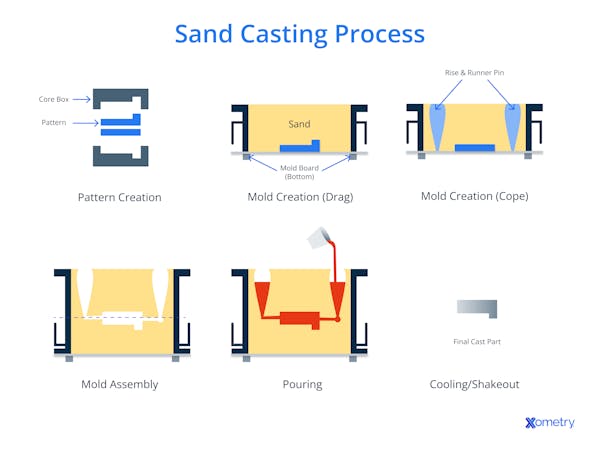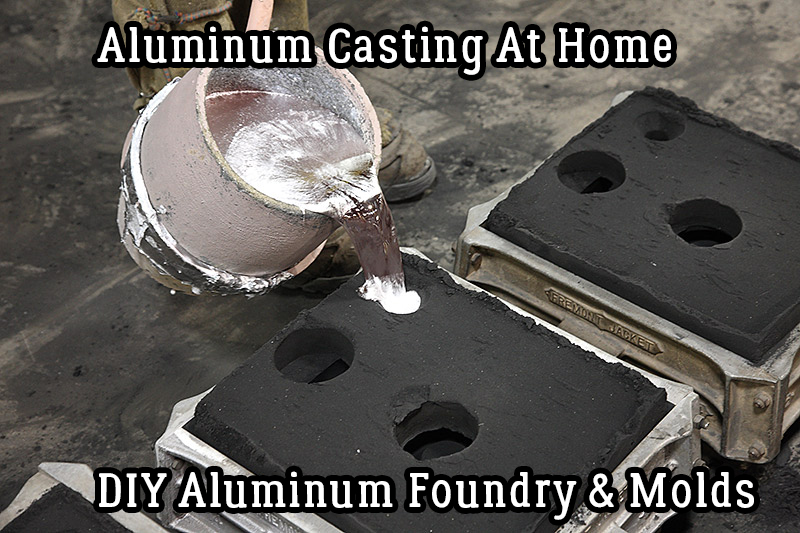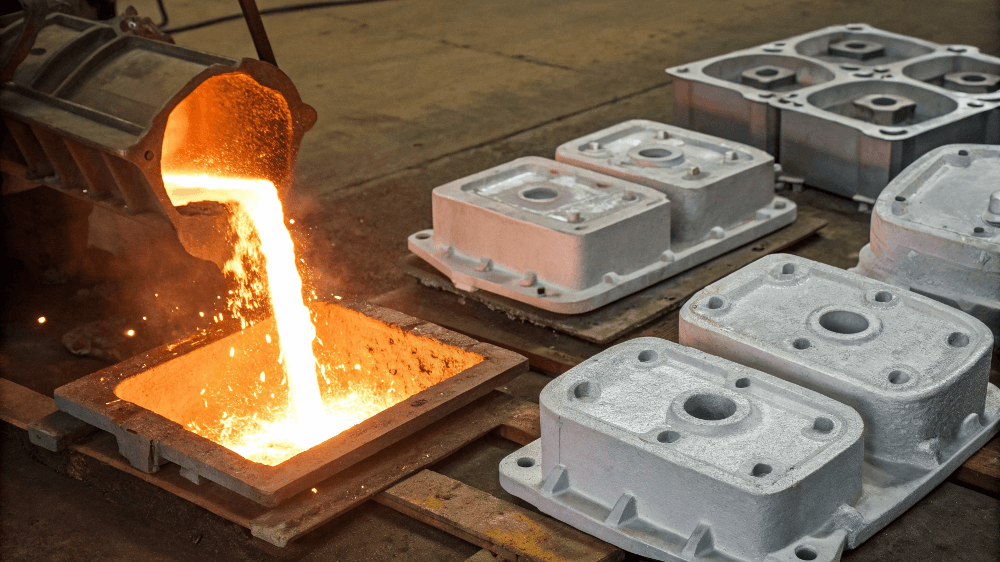Checking Out the Crucial Function of Aluminum Foundry in Modern Production Processes
Light weight aluminum shops serve an essential feature in modern manufacturing. They transform raw aluminum into important elements throughout different industries. This conversion procedure is noted by sophisticated casting techniques that boost effectiveness. Additionally, the shops are progressively embracing lasting techniques, mirroring a shift in the direction of ecologically responsible manufacturing. Recognizing their function discloses not simply their influence on production yet additionally the broader ramifications for development and sustainability in the sector. What lies ahead for aluminum shops in this developing landscape?
The Importance of Aluminum in Modern Manufacturing
Light weight aluminum plays a pivotal function in modern production as a result of its unique homes. This light-weight steel is known for its outstanding strength-to-weight proportion, making it a suitable selection for numerous applications. Its rust resistance improves sturdiness, lowering maintenance expenses and boosting item longevity. The pliability and ductility of light weight aluminum enable complex forms and intricate designs, which are important in markets varying from automobile to aerospace. In addition, aluminum's thermal and electrical conductivity makes it appropriate for electric parts and heat exchangers. The recyclability of aluminum substantially adds to sustainable manufacturing practices, as it can be recycled without loss of quality. This adaptability not only sustains innovation yet additionally aids fulfill the growing demand for ecologically friendly remedies. On the whole, light weight aluminum's distinct attributes position it as a basic product in modern production, driving improvements and effectiveness across several fields.
Review of the Light Weight Aluminum Spreading Process
The aluminum spreading procedure is a necessary approach for shaping this functional metal right into intricate kinds matched for a variety of applications. This process generally begins with melting light weight aluminum ingots in a heater, where temperatures can surpass 1,200 levels Fahrenheit. Once the light weight aluminum reaches a molten state, it is poured right into a mold and mildew developed to develop the preferred form.
There are numerous casting approaches employed, consisting of sand casting, die casting, and financial investment spreading, each offering one-of-a-kind advantages for various applications. After the aluminum strengthens and cools down, the mold is eliminated, disclosing the actors component, which may require more ending up processes such as machining or surface area treatment to accomplish the called for specifications.
Quality control is important throughout the casting procedure, making certain that the last products fulfill sector standards for stamina, durability, and dimensional precision. This meticulous method highlights the importance of aluminum casting in modern-day production.
Key Advantages of Aluminum Foundries
Aluminum factories provide a number of crucial benefits that enhance modern-day production processes. The lightweight nature of aluminum contributes to significant weight cost savings in various applications, while cost-effective production services make it an appealing choice for producers. Furthermore, the functional layout abilities of light weight aluminum enable complex and ingenious product advancement, conference varied sector demands.
Light-weight Product Conveniences
In the domain name of modern-day manufacturing, light-weight products have actually ended up being a vital emphasis, with light weight aluminum foundries using considerable benefits. Light weight aluminum, recognized for its reduced density yet durable toughness, allows the production of parts that decrease overall weight without endangering architectural stability. This characteristic is specifically useful in industries such as automobile and aerospace, where reducing weight equates to enhanced gas effectiveness and performance. Light weight aluminum's exceptional deterioration resistance boosts product durability, decreasing maintenance demands. The adaptability of light weight aluminum shop processes enables intricate geometries and complex styles, promoting innovative applications. Furthermore, aluminum's recyclability adds to sustainability initiatives, making it an environmentally friendly option in modern-day manufacturing practices. These lightweight product advantages position light weight aluminum shops as essential players ahead of time modern production.
Cost-efficient Manufacturing Solutions
While numerous materials can be utilized in production, light weight aluminum shops stand out for their economical remedies that enhance manufacturing efficiency. The procedures employed in light weight aluminum shops, such as die casting and sand spreading, allow for high-volume manufacturing at reduced prices compared to other materials. The light-weight nature of aluminum minimizes delivery and handling expenditures, even more adding to general cost savings. Additionally, aluminum's recyclability lessens waste and decreases material costs, making it an eco-friendly option. The fast turnaround times typical of light weight aluminum shops allow suppliers to react rapidly to market demands, guaranteeing affordable pricing. Furthermore, the longevity of aluminum elements results in reduce maintenance expenses over the item's lifecycle, solidifying its setting as a financially sensible option in modern-day production.
Versatile Style Capabilities
The adaptability of light weight aluminum shops significantly enhances their allure in modern production. They use a large range of style abilities, making it possible for the production of facility and intricate shapes that fulfill particular customer requirements. This flexibility enables for the assimilation of different features, such as lightweight structures and improved thermal buildings, making aluminum an ideal option for varied applications. The capability to make use of various casting approaches, consisting of sand, pass away, and investment spreading, further expands their style potential. This versatility not just suits custom-made layouts yet also assists in quick prototyping, decreasing time to market. Subsequently, aluminum foundries play a necessary duty in making sure that suppliers can introduce while maintaining efficiency and high quality in their manufacturing procedures.
Advancements in Light Weight Aluminum Spreading Technologies
As improvements in modern technology reshape the landscape of production, advancements in aluminum spreading have actually become a crucial pressure driving performance and top quality. One substantial growth is the introduction of computer numerical control (CNC) machining, which enhances accuracy in mold-making and minimizes production time (Aluminum Foundry). Furthermore, the adoption of innovative simulation software program permits factories to predict and rectify possible flaws in the casting procedure, leading to boosted product stability
Strategies such as low-pressure die casting and vacuum spreading are obtaining grip, offering enhanced control his explanation over metal circulation and minimizing porosity in final items. The combination of 3D printing also offers possibilities for fast prototyping and the creation of complicated geometries that were formerly unattainable.
These developments not only strengthen the competitive edge of aluminum foundries yet also fulfill the developing needs of markets ranging from automotive to aerospace, making certain top quality parts with optimized performance. - Aluminum Foundry
Sustainability Practices in Light Weight Aluminum Foundries
Recognizing the urgent requirement for ecological responsibility, aluminum factories are increasingly embracing sustainability techniques that reduce their ecological footprint. These methods incorporate various methods aimed at decreasing waste, preserving power, and utilizing recycled materials. Several foundries have implemented sophisticated recycling systems, permitting them to redeem and reuse light weight aluminum scrap, significantly decreasing product intake and waste production.
Furthermore, energy-efficient innovations, such as electric melting furnaces, are being adopted to decrease greenhouse gas emissions. Additionally, factories are concentrating on water preservation via closed-loop systems, which recycle procedure water, consequently lessening freshwater use.
Applying sustainability certifications and adhering to industry standards further improves their dedication to environmental stewardship. By accepting these methods, aluminum shops not only add to a greener earth Check Out Your URL however additionally enhance their operational performance and competition in the market. This shift towards sustainable operations reflects a growing pattern in modern manufacturing that prioritizes both ecological and economic wellness.
The Function of Light Weight Aluminum Foundries in the Supply Chain
Aluminum shops serve as critical nodes in the manufacturing supply chain, giving crucial products that fuel various sectors. They play a substantial function in transforming raw aluminum into usable parts with casting procedures, which are fundamental for sectors such as vehicle, aerospace, and building. By producing light-weight yet resilient components, light weight aluminum factories contribute to improved item efficiency and power efficiency.
The combination of factories right into the supply chain guarantees a consistent circulation of premium aluminum products, enabling makers to fulfill market demands quickly. In addition, shops frequently team up with producers and providers to optimize product sourcing and reduce lead times, fostering a more structured manufacturing procedure. Their knowledge in metallurgy and casting strategies allows them to introduce and adapt to the progressing requirements of different industries. Subsequently, aluminum shops are vital for keeping the integrity and performance of modern production operations.

Future Fads in Aluminum Manufacturing Processes
The future of aluminum manufacturing procedures is poised for significant improvement via automation and lasting methods. Advancements in automated systems are anticipated to boost efficiency and precision in manufacturing, while an expanding focus on sustainability will certainly drive the market towards eco-friendly approaches. With each other, these fads will certainly shape a much more ingenious and liable aluminum production landscape.
Automation in Light Weight Aluminum Production
In recent years, the integration of automation modern technologies has actually changed aluminum manufacturing, leading to boosted efficiency and accuracy. Automated systems simplify different processes, from melting and casting to completing, reducing human mistake and boosting outcome uniformity. Advanced robotics and device knowing algorithms assist in real-time monitoring and modifications, making sure optimal conditions throughout production. Aluminum Foundry. Making use of automated led vehicles (AGVs) enhances product handling, lessening downtime and labor prices. In addition, data analytics play an important duty in anticipating maintenance, allowing for timely interventions that lower tools failures. As the demand for top notch light weight aluminum products remains to rise, manufacturers are progressively embracing automation to Read Full Article continue to be affordable, streamline procedures, and respond quickly to market modifications while keeping item honesty
Lasting Production Practices
An expanding focus on lasting production techniques is forming the future of light weight aluminum manufacturing. Firms are significantly taking on environmentally friendly methods to lessen waste and minimize energy consumption. Advancements such as reusing efforts and using sustainable power resources are coming to be integral to the aluminum foundry sector. By executing closed-loop systems, makers can significantly reduce their carbon footprint while maximizing resource efficiency. Furthermore, advancements in alloy solutions are enabling the creation of lighter, more powerful materials that require less energy during production. Governing pressures and customer need for sustainable items are driving these adjustments, pushing manufacturers to prioritize ecological factors to consider together with conventional performance metrics. The pattern toward sustainability assures to change aluminum production, lining up industry exercise with global ecological goals.
Regularly Asked Concerns

What Are the Usual Applications of Aluminum Castings in Everyday Products?
Typical applications of aluminum castings consist of automotive elements, aerospace components, home devices, consumer electronic devices, and industrial machinery. These functional castings are preferred for their light-weight, rust resistance, and excellent thermal conductivity in different sectors.
Exactly How Do Light Weight Aluminum Foundries Ensure Quality Assurance in Their Production Processes?
Aluminum factories carry out rigorous quality assurance actions, including routine inspections, product testing, and adherence to industry standards. These methods ensure uniformity, resilience, and performance in the last items, inevitably boosting customer contentment and trust.

What Safety Steps Are Carried Out in Light Weight Aluminum Foundries During Production?
Security procedures in light weight aluminum shops throughout production include protective gear for workers, ventilation systems to take care of fumes, regular equipment maintenance, safety training programs, and adherence to regulative standards to minimize threats linked with molten metal handling.
How Does Light Weight Aluminum Recycling Effect Factory Operations and Sustainability?
Aluminum reusing significantly enhances shop procedures by minimizing basic material expenses and energy usage. This practice advertises sustainability, lessens waste, and supports circular economy concepts, eventually benefiting both the setting and the manufacturing market.
What Are the Normal Lead Times for Aluminum Casting Projects?
Normal preparation for light weight aluminum casting jobs differ, typically ranging from two to 6 weeks. Elements influencing these times include job intricacy, product schedule, and production capability, all of which add to the general timeline.
Aluminum foundries offer several vital advantages that enhance modern manufacturing procedures. In the domain name of modern-day manufacturing, light-weight products have actually ended up being an essential emphasis, with aluminum factories using considerable benefits. While lots of products can be utilized in production, aluminum foundries stand out for their cost-efficient services that enhance production efficiency. The flexibility of light weight aluminum factories significantly boosts their charm in modern-day manufacturing. Aluminum factories offer as important nodes in the manufacturing supply chain, offering important products that fuel various sectors.